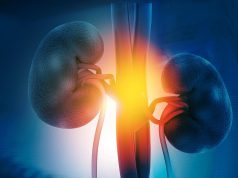Benefits seen particularly for younger patients and for reducing racial disparities in access to kidney transplants
By Lori Solomon HealthDay Reporter
WEDNESDAY, Nov. 12, 2025 (HealthDay News) — Expanding the wait-listing criteria for kidney transplantation to include risk for kidney failure — rather than taking a single measurement of kidney function — could improve outcomes, according to a study presented at Kidney Week, the annual meeting of the American Society of Nephrology, held from Nov. 5 to 9 in Houston.
Jennifer L. Bragg-Gresham, Ph.D., from the University of Michigan Medical School in Ann Arbor, and colleagues utilized data from ~1 million U.S. veterans (2022) to compare the two-year risk for progression to kidney failure of ≥25 percent, based on the Kidney Failure Risk Equation (KFRE), as wait-listing criterion versus the current estimated glomerular filtration rate (eGFR) ≤20 criterion.
The researchers found that when examining veterans with eGFR ≤20 mL/min/1.73 m2, the range of two-year risk for end-stage kidney disease (ESKD) was 0.1 to 99.9 percent (median, 46.2 percent). A total of 10,368 veterans would be eligible for wait-listing by one or both criteria (~60 percent by both and ~20 percent by only one of the two criteria). Based on criteria used, patient characteristics varied greatly. Compared with those who would qualify by KFRE ≥25 percent, veterans who would only qualify by the eGFR ≤20 criterion were much older (71 versus 53 years). Using only the KFRE criteria, more men, minority patients (Hispanic, Black, and Asian), and patients with diabetes and/or albuminuria would be wait-listed. All groups had similar rates for death and hospitalization. Progression to ESKD within the same year was highest among those with KFRE ≥25 percent, although it was rare.
“Expanding the wait-listing criteria for kidney transplantation to include risk of kidney failure prioritizes individualized approaches to care and could improve outcomes in younger patients with chronic kidney disease, as well as improve racial parity in access to kidney transplantation,” Bragg-Gresham said in a statement. “This approach will continue to be studied prospectively and in populations beyond veterans to verify its potential to improve patient outcomes.”
Copyright © 2025 HealthDay. All rights reserved.








